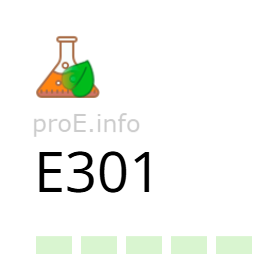
Other names for the additive (synonyms)
General Information
Food additive E301 – sodium ascorbate is the sodium salt of ascorbic acid, better known as vitamin C. This additive belongs to the group of antioxidants and acidity regulators. The main function of sodium ascorbate in the food industry is to prevent oxidation, extend the shelf life of products, and preserve their color and taste.
In nature, sodium ascorbate is not found in its pure form; however, its precursor – ascorbic acid – is present in many fruits and vegetables (citrus fruits, kiwi, rose hips, currants, red peppers, tomatoes).
In industry, additive E301 is produced synthetically by dissolving ascorbic acid in water with the addition of sodium bicarbonate. After the reaction is complete and foaming stops, the compound is precipitated with isopropanol, yielding a stable substance in the form of a white or slightly yellowish powder.
The chemical formula of sodium ascorbate is C6H7NaO6. It dissolves well in water, has a slightly salty-sour taste, and high bioavailability. The additive is more resistant to heat and light than pure ascorbic acid, which makes it convenient for industrial applications.
Effect on the Body
Benefits of additive E301
As a derivative of vitamin C, additive E301 provides several health benefits. It is involved in collagen synthesis, strengthening connective and bone tissue, improving iron absorption, and supporting the proper functioning of the immune system.
Sodium ascorbate is used in medical practice to address vitamin C deficiency, especially in people with high stomach acidity who may struggle to tolerate pure ascorbic acid. It helps reduce the risk of atherosclerosis and cardiovascular diseases and also plays a supportive role in infection therapy.
Studies show that the antioxidant properties of the additive help neutralize free radicals and slow down cellular aging processes. Moreover, some scientific publications point to the potential use of sodium ascorbate in oncology as an adjunct therapy.
Risks of additive E301
Overall, additive E301 is considered safe. The European Food Safety Authority concluded that it is unnecessary to establish an Acceptable Daily Intake (ADI) for ascorbic acid and its salts, including sodium ascorbate, since no health risks have been identified at normal intake levels.
However, excessive intake of sodium ascorbate may cause side effects such as diarrhea, abdominal pain, irritation of the urinary tract mucosa, and allergic reactions. In high doses (hundreds of milligrams or more), additive E301 may increase the risk of kidney stone formation in predisposed individuals.
The Joint FAO/WHO Expert Committee on Food Additives (JECFA) has also not identified serious concerns regarding the toxicity of additive E301. The U.S. Food and Drug Administration (FDA) classifies sodium ascorbate as Generally Recognized As Safe (GRAS).
Uses
In the food industry, additive E301 is mainly used as an antioxidant and acidity regulator. It prevents the oxidation of fats and vitamins, helps preserve the natural color of meat and fish products, and improves their flavor. In sausage products, sodium ascorbate stabilizes color and prevents the appearance of grayish tones.
The additive is widely used in confectionery, canned products, bakery goods, soft and energy drinks, and baby food.
In pharmaceuticals, sodium ascorbate is included in vitamin complexes and preparations for the prevention and treatment of vitamin C deficiency.
Legal Status
Additive E301 is permitted for use in the European Union, the United States, Canada, Ukraine, the Russian Federation, Japan, and many other countries.
In accordance with Regulation (EU) No 231/2012, clear specifications regarding its purity and permissible levels of impurities are established.